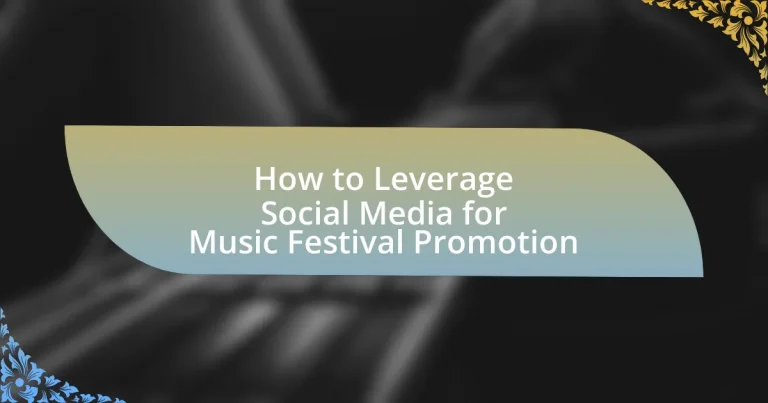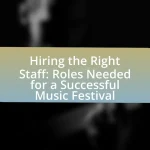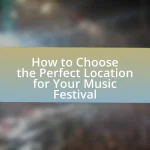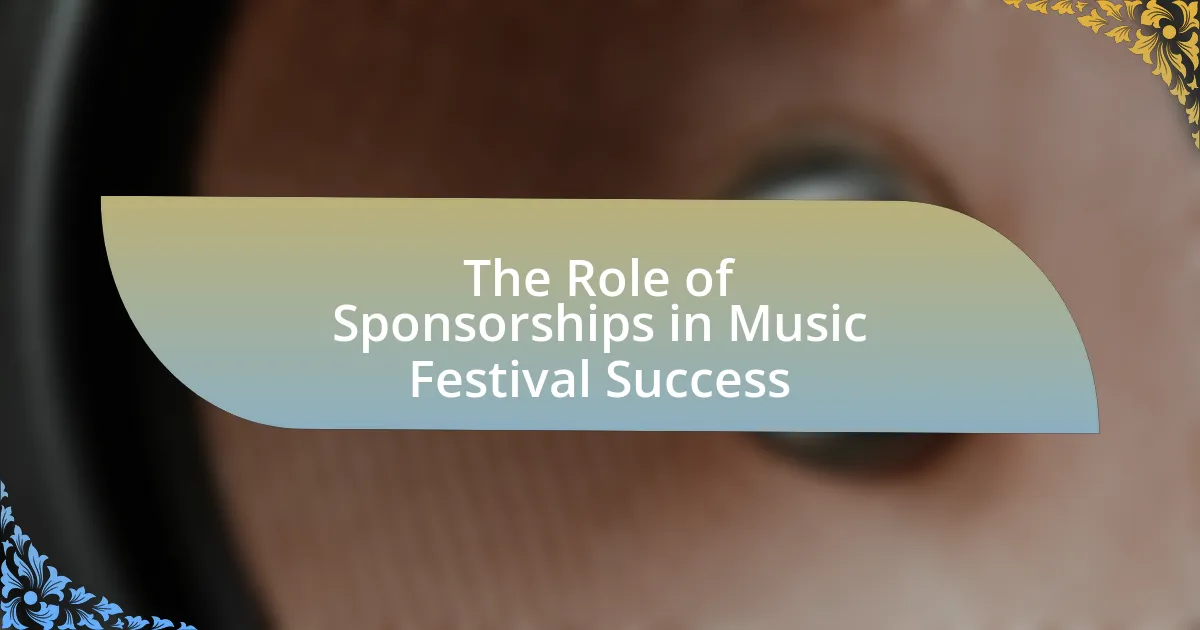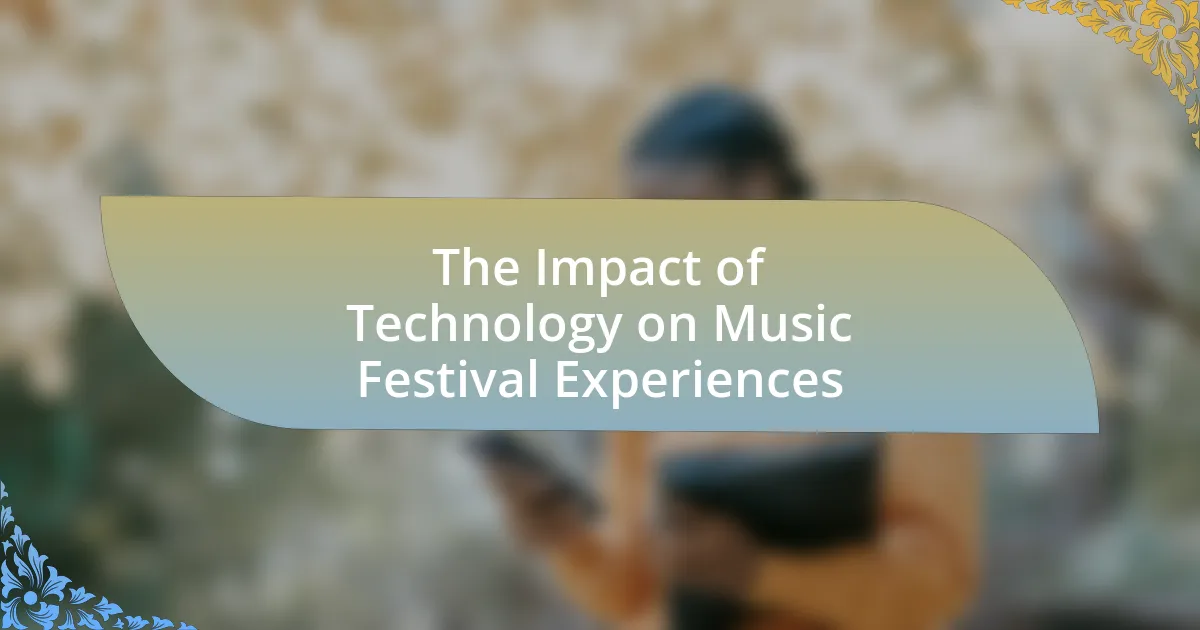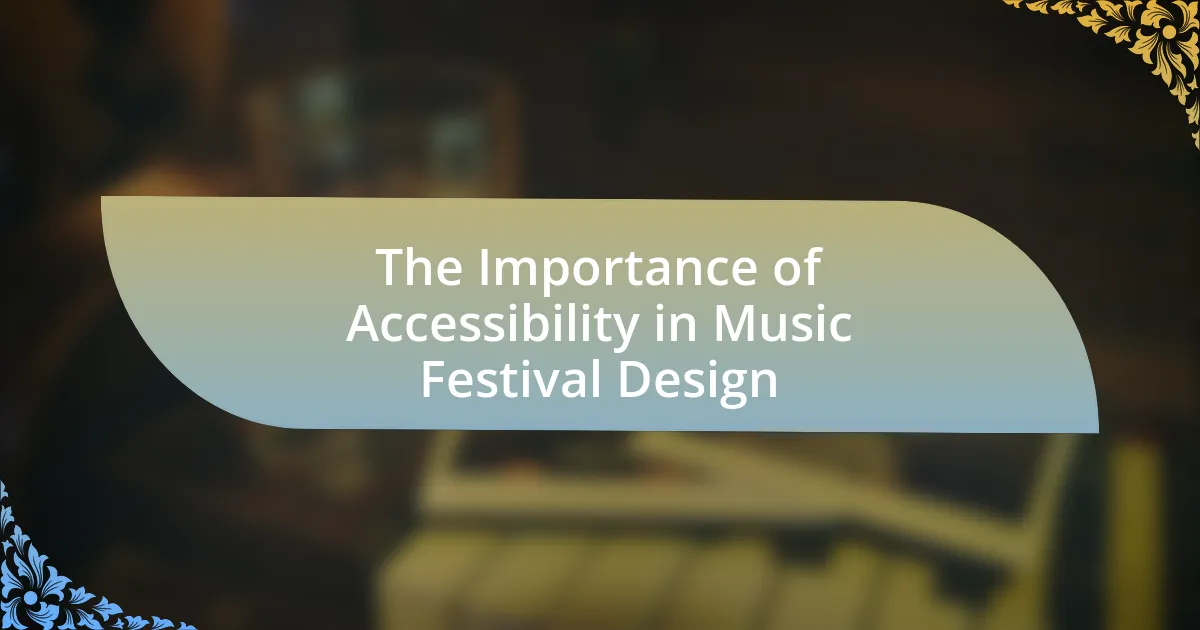The article focuses on leveraging social media for music festival promotion, highlighting its significance in engaging audiences and driving ticket sales. It outlines key platforms such as Facebook, Instagram, Twitter, and TikTok, detailing how each caters to different demographics and offers unique promotional features. The article emphasizes the importance of creating engaging content, utilizing targeted advertising, and fostering community interaction through user-generated content and influencer partnerships. Additionally, it discusses best practices for effective social media campaigns, including the use of analytics to refine strategies and avoid common pitfalls in audience engagement.
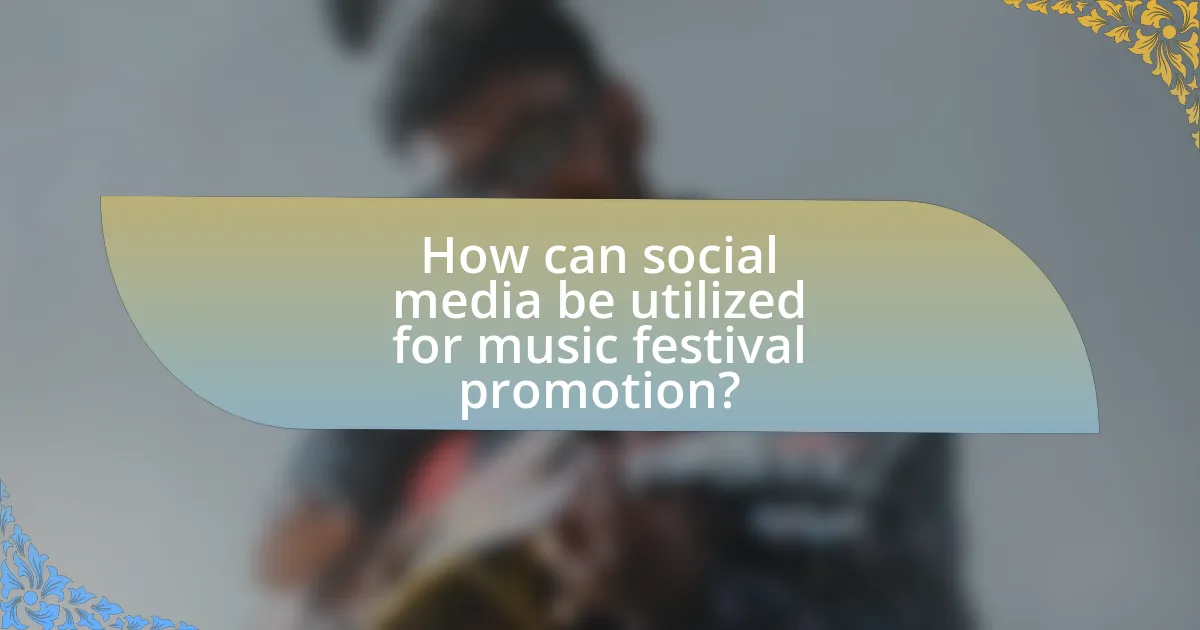
How can social media be utilized for music festival promotion?
Social media can be utilized for music festival promotion by creating engaging content that resonates with the target audience. Platforms like Instagram, Facebook, and Twitter allow festival organizers to share updates, artist lineups, and behind-the-scenes footage, which can generate excitement and anticipation. For instance, a study by Eventbrite found that 93% of event organizers use social media to promote their events, highlighting its effectiveness in reaching potential attendees. Additionally, leveraging user-generated content, such as encouraging attendees to share their experiences, can enhance community engagement and broaden the festival’s reach.
What are the key social media platforms for music festival promotion?
The key social media platforms for music festival promotion are Facebook, Instagram, Twitter, and TikTok. Facebook is widely used for event creation and community engagement, allowing promoters to reach a broad audience through targeted ads and event pages. Instagram excels in visual storytelling, making it ideal for sharing engaging content such as artist lineups and behind-the-scenes footage. Twitter facilitates real-time updates and interactions, which is crucial for engaging with fans and sharing news quickly. TikTok has rapidly gained popularity among younger audiences, enabling viral marketing through creative short videos that can showcase festival experiences and performances. These platforms collectively enhance visibility and engagement for music festivals, driving ticket sales and audience participation.
How does each platform cater to different audience demographics?
Different social media platforms cater to various audience demographics through their unique features and user bases. For instance, Facebook primarily attracts a diverse age range, making it suitable for promoting music festivals to families and older audiences, while Instagram appeals more to younger users, particularly millennials and Gen Z, who engage with visual content. TikTok, with its short-form video format, targets a predominantly younger demographic, allowing festival promoters to create viral content that resonates with teens and young adults. Twitter serves a more news-oriented audience, making it effective for real-time updates and engaging with festival-goers during events. Each platform’s user demographics and content style dictate how effectively they can reach and engage specific audience segments, thereby enhancing promotional strategies for music festivals.
What unique features do these platforms offer for event promotion?
Social media platforms offer unique features for event promotion, including targeted advertising, event pages, and real-time engagement tools. Targeted advertising allows promoters to reach specific demographics based on interests, location, and behaviors, enhancing the effectiveness of promotional campaigns. Event pages enable users to create dedicated spaces for their events, providing essential details and facilitating RSVPs, which can increase attendance. Real-time engagement tools, such as live streaming and interactive polls, foster community involvement and excitement, allowing promoters to connect with their audience instantly. These features collectively enhance visibility and engagement, making social media a powerful tool for music festival promotion.
Why is social media important for music festival marketing?
Social media is crucial for music festival marketing because it enables direct engagement with audiences, amplifying reach and fostering community. Platforms like Facebook, Instagram, and Twitter allow festival organizers to share real-time updates, promote ticket sales, and showcase artists, which can significantly increase attendance. According to a 2021 report by Eventbrite, 80% of event organizers believe social media is essential for promoting their events, highlighting its effectiveness in reaching potential attendees. Additionally, user-generated content on social media can enhance credibility and attract more participants, as 79% of consumers say user-generated content highly impacts their purchasing decisions.
How does social media enhance audience engagement?
Social media enhances audience engagement by facilitating real-time interaction and fostering community among users. Platforms like Facebook, Instagram, and Twitter allow event organizers to share updates, respond to inquiries, and create discussions around music festivals, which increases audience participation. According to a study by Sprout Social, 64% of consumers want brands to connect with them on social media, indicating that active engagement can lead to stronger relationships and loyalty. Additionally, user-generated content, such as posts and stories from attendees, amplifies reach and encourages others to participate, further enhancing engagement.
What role does social media play in building a festival’s brand identity?
Social media plays a crucial role in building a festival’s brand identity by facilitating direct engagement with audiences and creating a recognizable online presence. Through platforms like Instagram, Facebook, and Twitter, festivals can share visual content, updates, and interact with attendees, which fosters community and loyalty. For instance, a study by Eventbrite found that 80% of festival-goers use social media to discover events, highlighting its effectiveness in reaching potential attendees. Additionally, consistent branding across social media channels helps establish a festival’s unique voice and aesthetic, making it more memorable. This strategic use of social media not only enhances visibility but also cultivates a distinct brand identity that resonates with target audiences.
What strategies can be employed for effective social media promotion?
Effective social media promotion for music festivals can be achieved through targeted content creation, audience engagement, and strategic partnerships. Targeted content creation involves crafting visually appealing posts that highlight festival lineups, behind-the-scenes footage, and attendee experiences, which can increase audience interest and shares. Audience engagement is crucial; responding to comments, hosting live Q&A sessions, and encouraging user-generated content can foster a community around the festival. Strategic partnerships with influencers and local businesses can expand reach and credibility, as collaborations often lead to cross-promotion and access to new audiences. According to a study by Sprout Social, 70% of consumers feel more connected to brands with a strong social media presence, reinforcing the importance of these strategies in effective social media promotion.
How can content creation be optimized for social media platforms?
Content creation can be optimized for social media platforms by tailoring content to each platform’s unique audience and format. For instance, using visually engaging images and videos on Instagram can increase engagement, as studies show that posts with images receive 650% higher engagement than text-only posts. Additionally, incorporating relevant hashtags can enhance discoverability; research indicates that tweets with hashtags receive 33% more engagement. Furthermore, posting at optimal times based on audience activity can significantly boost visibility; for example, studies suggest that the best times to post on Facebook are between 1 PM and 3 PM on weekdays. By focusing on these strategies, content creators can effectively enhance their reach and engagement on social media platforms.
What types of posts generate the most engagement for music festivals?
Visual content, particularly videos and high-quality images, generates the most engagement for music festivals. Posts showcasing live performances, behind-the-scenes footage, and artist interviews tend to attract significant interaction, as they provide immersive experiences that resonate with audiences. According to a study by HubSpot, visual content is 40 times more likely to be shared on social media than other types of content, highlighting its effectiveness in engaging festival-goers. Additionally, user-generated content, such as fan photos and testimonials, fosters community and encourages sharing, further enhancing engagement levels.
How can partnerships and collaborations enhance social media efforts?
Partnerships and collaborations can significantly enhance social media efforts by expanding reach and increasing engagement. When organizations or individuals collaborate, they combine their audiences, which can lead to a larger follower base and greater visibility. For instance, a music festival partnering with popular artists or influencers can tap into their established fan bases, resulting in higher ticket sales and social media interactions. According to a study by the Content Marketing Institute, 70% of marketers believe that partnerships can enhance brand visibility and engagement on social media platforms. This demonstrates that strategic collaborations not only amplify promotional efforts but also foster community engagement, making social media campaigns more effective.
What types of partnerships are most beneficial for music festival promotion?
Strategic partnerships with brands, local businesses, and influencers are most beneficial for music festival promotion. Collaborating with brands that align with the festival’s target audience can enhance visibility and attract sponsorships, as evidenced by festivals like Coachella, which partners with major brands for promotional campaigns. Local businesses can provide logistical support and cross-promotional opportunities, increasing community engagement and attendance. Additionally, influencers can amplify reach through their social media platforms, as seen with festivals that utilize influencer marketing to drive ticket sales and social media buzz. These partnerships create a multifaceted promotional strategy that leverages various channels for maximum impact.
How can influencers be leveraged to reach a wider audience?
Influencers can be leveraged to reach a wider audience by collaborating with them to promote events, products, or brands through their established social media platforms. This collaboration allows for access to the influencer’s followers, who are often highly engaged and trust the influencer’s recommendations. For instance, a study by the Digital Marketing Institute found that 49% of consumers depend on influencer recommendations when making purchasing decisions, highlighting the effectiveness of influencer marketing. By strategically selecting influencers whose audience aligns with the target demographic of a music festival, promoters can significantly enhance visibility and engagement, ultimately leading to increased ticket sales and brand awareness.
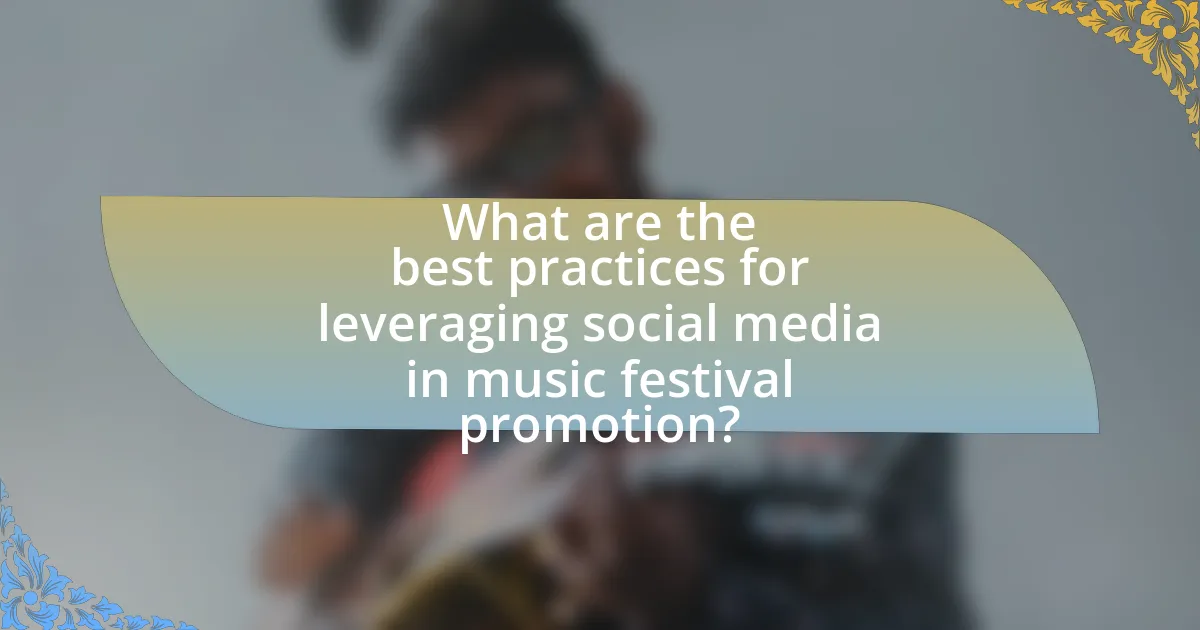
What are the best practices for leveraging social media in music festival promotion?
The best practices for leveraging social media in music festival promotion include creating engaging content, utilizing targeted advertising, and fostering community interaction. Engaging content, such as behind-the-scenes videos, artist interviews, and interactive polls, captures audience interest and encourages sharing. Targeted advertising on platforms like Facebook and Instagram allows promoters to reach specific demographics, increasing ticket sales and awareness. Additionally, fostering community interaction through live Q&A sessions, contests, and user-generated content builds a loyal fan base and enhances the festival’s visibility. According to a study by Eventbrite, 93% of event creators use social media to promote their events, highlighting its effectiveness in reaching potential attendees.
How can analytics be used to improve social media strategies?
Analytics can be used to improve social media strategies by providing insights into audience behavior, engagement metrics, and content performance. By analyzing data such as likes, shares, comments, and click-through rates, marketers can identify which types of content resonate most with their audience. For instance, a study by Sprout Social found that posts with images receive 650% more engagement than text-only posts. This data allows marketers to tailor their content strategy, optimize posting times, and enhance audience targeting, ultimately leading to more effective social media campaigns for music festival promotion.
What metrics should be tracked for effective evaluation?
For effective evaluation of social media promotion for music festivals, key metrics to track include engagement rate, reach, impressions, conversion rate, and audience growth. Engagement rate measures the level of interaction (likes, shares, comments) relative to total followers, indicating content effectiveness. Reach quantifies the total number of unique users who see posts, while impressions count total views, helping assess visibility. Conversion rate tracks the percentage of users taking desired actions, such as ticket purchases, reflecting promotional success. Audience growth measures the increase in followers over time, indicating brand interest and potential ticket sales. These metrics provide a comprehensive view of social media performance and its impact on festival promotion.
How can insights from analytics inform future campaigns?
Insights from analytics can inform future campaigns by identifying audience preferences and engagement patterns. By analyzing data such as social media interactions, ticket sales, and demographic information, marketers can tailor their messaging and promotional strategies to better resonate with their target audience. For example, a study by HubSpot found that campaigns based on data-driven insights can increase conversion rates by up to 30%. This demonstrates that leveraging analytics not only enhances understanding of what content performs best but also optimizes resource allocation for maximum impact in future marketing efforts.
What are common pitfalls to avoid in social media promotion?
Common pitfalls to avoid in social media promotion include inconsistent branding, neglecting audience engagement, and failing to analyze performance metrics. Inconsistent branding can confuse potential attendees and dilute the festival’s identity, as studies show that cohesive branding increases recognition by up to 80%. Neglecting audience engagement leads to missed opportunities for building community and loyalty, with research indicating that brands that actively engage with their audience see a 20-40% increase in customer retention. Lastly, failing to analyze performance metrics prevents promoters from understanding what strategies work, as data-driven decisions can improve campaign effectiveness by 30% or more.
How can over-promotion negatively impact audience perception?
Over-promotion can negatively impact audience perception by creating a sense of fatigue and distrust towards the promoted content. When audiences are bombarded with excessive promotional messages, they may perceive the brand or event as insincere or desperate for attention, leading to a decline in engagement. Research indicates that 70% of consumers feel annoyed by repetitive ads, which can result in negative associations with the brand. This perception can ultimately diminish the perceived value of the music festival, as audiences may question the authenticity of the experience being offered.
What mistakes should be avoided when engaging with followers?
When engaging with followers, mistakes to avoid include ignoring comments and messages, which can lead to disengagement and a perception of unapproachability. Engaging with followers is crucial for building a community and fostering loyalty; research indicates that brands that respond to customer inquiries can see a 20% increase in customer satisfaction. Additionally, posting inconsistent content can confuse followers and dilute brand identity, as consistent messaging is essential for recognition and trust. Lastly, failing to analyze engagement metrics can result in missed opportunities for improvement; studies show that brands that regularly assess their social media performance can enhance their engagement rates by up to 30%.
How can user-generated content be utilized in promotion?
User-generated content can be utilized in promotion by showcasing authentic experiences and testimonials from attendees, which enhances credibility and engagement. For instance, sharing photos, videos, and reviews from festival-goers on social media platforms can create a sense of community and encourage potential attendees to participate. According to a study by Nielsen, 92% of consumers trust organic, user-generated content more than traditional advertising, highlighting its effectiveness in influencing purchasing decisions. This approach not only amplifies reach but also fosters a deeper connection between the festival brand and its audience.
What are effective ways to encourage attendees to share their experiences?
Effective ways to encourage attendees to share their experiences include creating engaging social media campaigns and providing incentives for sharing. Engaging campaigns can involve hashtags specific to the event, encouraging attendees to post photos and stories using these tags, which increases visibility and interaction. Providing incentives, such as contests or giveaways for the best posts, motivates attendees to share their experiences actively. Research indicates that events with dedicated social media strategies see a 30% increase in attendee engagement, demonstrating the effectiveness of these methods in promoting sharing.
How can user-generated content enhance authenticity and trust?
User-generated content enhances authenticity and trust by providing real experiences and perspectives from actual attendees, which resonate more with potential participants than traditional marketing. This type of content, such as photos, reviews, and testimonials shared on social media, showcases genuine interactions and emotions associated with the event. According to a study by Nielsen, 92% of consumers trust organic, user-generated content more than traditional advertising, indicating that peer recommendations significantly influence purchasing decisions. By leveraging user-generated content, music festivals can create a more relatable and credible image, fostering a sense of community and encouraging new attendees to engage with the event.
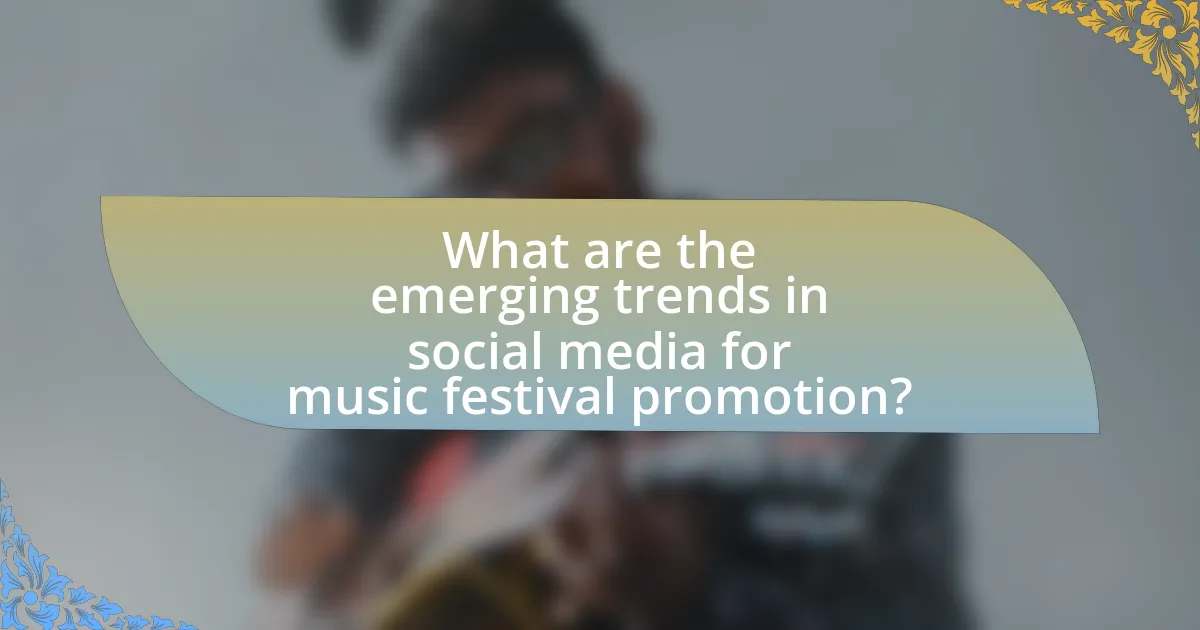
What are the emerging trends in social media for music festival promotion?
Emerging trends in social media for music festival promotion include the use of short-form video content, influencer partnerships, and interactive experiences. Short-form videos, particularly on platforms like TikTok and Instagram Reels, have become essential for engaging audiences quickly and effectively, with studies showing that video content can increase engagement rates by up to 1200%. Influencer partnerships leverage the reach of popular social media figures to promote festivals, as 49% of consumers depend on influencer recommendations for their purchasing decisions. Additionally, interactive experiences such as live Q&A sessions, polls, and augmented reality filters enhance audience participation and create a sense of community, which is crucial for festival promotion in a crowded market.
How is live streaming changing the landscape of festival promotion?
Live streaming is transforming festival promotion by expanding audience reach and enhancing engagement. Festivals can now broadcast performances in real-time, allowing fans who cannot attend in person to participate virtually, thus increasing overall attendance numbers. For instance, the Coachella Valley Music and Arts Festival reported that its live stream attracted over 43 million viewers in 2022, significantly boosting its global visibility. Additionally, live streaming enables festivals to create interactive experiences through social media integration, where viewers can comment and share their experiences, further amplifying promotional efforts. This shift not only democratizes access to live events but also provides valuable data on viewer preferences and behaviors, allowing organizers to tailor future marketing strategies effectively.
What are the benefits of incorporating live streaming into marketing strategies?
Incorporating live streaming into marketing strategies enhances audience engagement and broadens reach. Live streaming allows brands to connect with viewers in real-time, fostering a sense of community and immediacy that pre-recorded content cannot achieve. According to a report by Livestream and New York Magazine, 80% of consumers prefer watching live videos from brands rather than reading blogs, highlighting the effectiveness of live streaming in capturing attention. Additionally, live streaming can increase conversion rates; a study by Wyzowl found that 74% of users who watched a product video subsequently purchased the product. This demonstrates that live streaming not only engages audiences but also drives sales, making it a valuable tool in marketing strategies.
How can festivals engage remote audiences through live streaming?
Festivals can engage remote audiences through live streaming by providing interactive experiences that replicate the in-person atmosphere. This can include real-time chat features, live polls, and virtual meet-and-greets with artists, which enhance audience participation. According to a report by Eventbrite, 80% of attendees prefer events that offer interactive elements, indicating that engagement strategies significantly impact viewer satisfaction. Additionally, utilizing multiple camera angles and behind-the-scenes content can create a more immersive experience, making remote viewers feel like they are part of the event.
What role does social media advertising play in festival promotion?
Social media advertising plays a crucial role in festival promotion by enhancing visibility and engagement among target audiences. It allows festival organizers to reach a broader demographic through targeted ads, which can be customized based on user interests, location, and behavior. For instance, a study by Eventbrite found that 80% of event organizers use social media to promote their events, highlighting its effectiveness in driving ticket sales and increasing attendance. Additionally, social media platforms facilitate real-time interaction, enabling organizers to share updates, engage with attendees, and create a sense of community, which further amplifies promotional efforts.
How can targeted ads improve ticket sales and attendance?
Targeted ads can significantly improve ticket sales and attendance by reaching specific audiences who are most likely to be interested in the event. By utilizing data analytics, event organizers can identify demographics, interests, and behaviors of potential attendees, allowing for tailored advertising that resonates with these groups. For instance, a study by Facebook found that targeted ads can increase conversion rates by up to 50%, as they ensure that promotional content is shown to users who have previously engaged with similar events or artists. This precision in targeting not only enhances the likelihood of ticket purchases but also fosters a sense of community among attendees, as they feel the event is curated for their interests.
What are the best practices for creating effective social media ads?
The best practices for creating effective social media ads include targeting the right audience, using engaging visuals, crafting compelling copy, and optimizing for mobile devices. Targeting the right audience ensures that ads reach individuals most likely to attend the music festival, which can be achieved through demographic and interest-based targeting options available on platforms like Facebook and Instagram. Engaging visuals, such as high-quality images or videos of past festivals, capture attention and evoke emotions, increasing the likelihood of interaction. Compelling copy should include a clear call-to-action and highlight unique aspects of the festival, such as headlining artists or special experiences. Finally, optimizing ads for mobile devices is crucial, as a significant portion of social media traffic comes from smartphones; ads should load quickly and be easy to navigate on smaller screens. According to a report by HubSpot, ads with images produce 650% higher engagement than text-only posts, reinforcing the importance of visuals in social media advertising.
What practical tips can enhance social media promotion for music festivals?
To enhance social media promotion for music festivals, utilize targeted advertising to reach specific demographics. Targeted ads on platforms like Facebook and Instagram allow festival organizers to tailor their marketing efforts based on user interests, location, and behaviors, increasing engagement and ticket sales. According to a study by the Pew Research Center, 69% of adults in the U.S. use Facebook, making it a vital platform for reaching potential attendees. Additionally, creating engaging content such as behind-the-scenes videos, artist interviews, and interactive polls can foster community and excitement around the festival. Research indicates that posts with visual content receive 94% more views than text-only posts, highlighting the importance of multimedia in social media strategies.
How can a content calendar streamline social media efforts?
A content calendar can streamline social media efforts by providing a structured schedule for content creation and posting. This organization allows teams to plan ahead, ensuring consistent messaging and timely engagement with the audience. Research indicates that brands using a content calendar can increase their posting frequency by up to 50%, leading to higher audience interaction and improved brand visibility. By mapping out content in advance, teams can also align their social media strategy with key festival dates and promotional activities, maximizing impact and reducing last-minute stress.
What are the key elements of a successful social media campaign for festivals?
The key elements of a successful social media campaign for festivals include targeted audience engagement, compelling content creation, strategic partnerships, and effective use of analytics. Targeted audience engagement ensures that the campaign reaches the right demographic, which is crucial for maximizing attendance; for instance, using Facebook Ads can help reach specific age groups and interests. Compelling content creation, such as high-quality visuals and engaging videos, captures attention and encourages sharing, which is vital for organic reach. Strategic partnerships with influencers or local businesses can amplify the campaign’s visibility and credibility, as seen in successful collaborations that have increased ticket sales by up to 30%. Finally, effective use of analytics allows for real-time adjustments to the campaign based on performance metrics, ensuring that resources are allocated efficiently and that engagement strategies are optimized.
